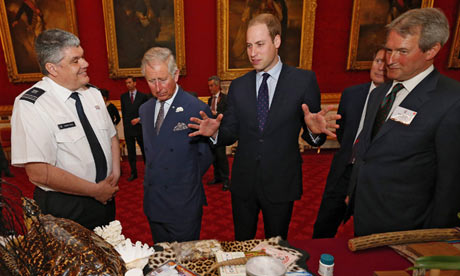drstevebest
posted: "
Wow, I knew if I lived long enough I would agree with
Prince Charles on something, and it seems we agree that
there is an implacable war against animals, a world war
on a global scale, starkly evident in the high-tech
poaching industry that is wiping ou"
Wow,
I knew if I
lived long
enough I would
agree with
Prince Charles
on something,
and it seems we
agree that there
is an implacable
war against
animals, a world
war on a global
scale, starkly
evident in the
high-tech
poaching
industry that is
wiping out
species such as
rhinos and
elephants before
our eyes (see,
for instance, my
posts here and here).
It seems we also
agree that the
human assault on
other
animals ought to
be viewed as and
treated as a war
in which we
defend animals
from attack by
any means
necessary on
this dying
planet (see, for
instance, my
posts here and
here).
Nice
to be in
agreement with
you on these
points, Prince
Charles. Now how
about putting
the UK's armed
forces in the service
of wildlife
under attack?
****************************************************
The
Guardian,
May 21, 2013

Prince
Charles and
Prince William
examine
confiscated
items made
from
endangered
animals at the
conference.
Prince
Charles has
warned that
criminal gangs
are turning to
animal
poaching, an
unprecedented
slaughter of
species that
can only be
stopped by
waging war on
the
perpetrators,
in the latest
of a series of
increasingly
outspoken
speeches about
the
environment.
Addressing
a conference
of
conservationists
at St James's
Palace in
London, the
Prince of
Wales
announced a
meeting of
heads of state
to take place
this autumn in
London under
government
auspices to
combat what he
described as
an emerging,
militarised
crisis.
"We
face one of
the most
serious
threats to wildlife ever,
and we must
treat it as a
battle –
because it is
precisely
that," said
Charles.
"Organised
bands of
criminals are
stealing and
slaughtering
elephants,
rhinoceros and
tigers, as
well as large
numbers of
other species,
in a way that
has never been
seen before.
They are
taking these animals,
sometimes in
unimaginably
high numbers,
using the
weapons of war
– assault
rifles,
silencers,
night-vision
equipment and
helicopters."
It is
the second
outspoken
speech that
Charles has
made this
month, at a
time when he
is taking on
an increasing
number of
monarchical
duties, after
he told a
group of
forest
scientists
also at St
James's Palace
that corporate
lobbyists and
climate change
sceptics were
turning the
Earth into a
"dying
patient".
The Prince of
Wales warned
that iconic
species –
which could
include
rhinoceros,
tigers,
orangutans and
others – could
be extinct in
the wild
within a
decade if
efforts to
protect them
were not
stepped up.
"By urgent, I
mean urgent,"
he told the
dignitaries,
who included
governmental
and United
Nations
officials as
well as NGOs
and grassroots
activists.
His
son, the Duke
of Cambridge,
added to the
plea: "My fear
is that one of
two things
will stop the
illegal trade:
either we take
action to stem
the trade, or
we will run
out of the
animals. There
is no other
outcome
possible."
Charles
also stressed
the need to
deal with the
demand for
exotic
species. In
the past, much
of the market
for tiger
parts, rhino
horns and
ivory was said
to be driven
by beliefs in
traditional
Chinese
medicine, in
which the rare
animal parts
were believed
to have
curative or
aphrodisiac
properties.
But the prince
dismissed such
ideas, saying
the trade was
in fact about
status symbols
rather than
belief
systems. "The
bulk of the
intended use
is no longer
for products
that can be
classified as
traditional
medicines.
Instead, many
more people in
rapidly
growing
economies are
seeking exotic
products that
reflect their
economic
prosperity and
status."
The
conference
called for
celebrities to
publicise
their outrage
and opposition
to the trade,
and for young
people in
countries such
as China to be
educated to
reject the
demands of
their parents
for such
status-fuelled
goods.
|
|
|
|
|






